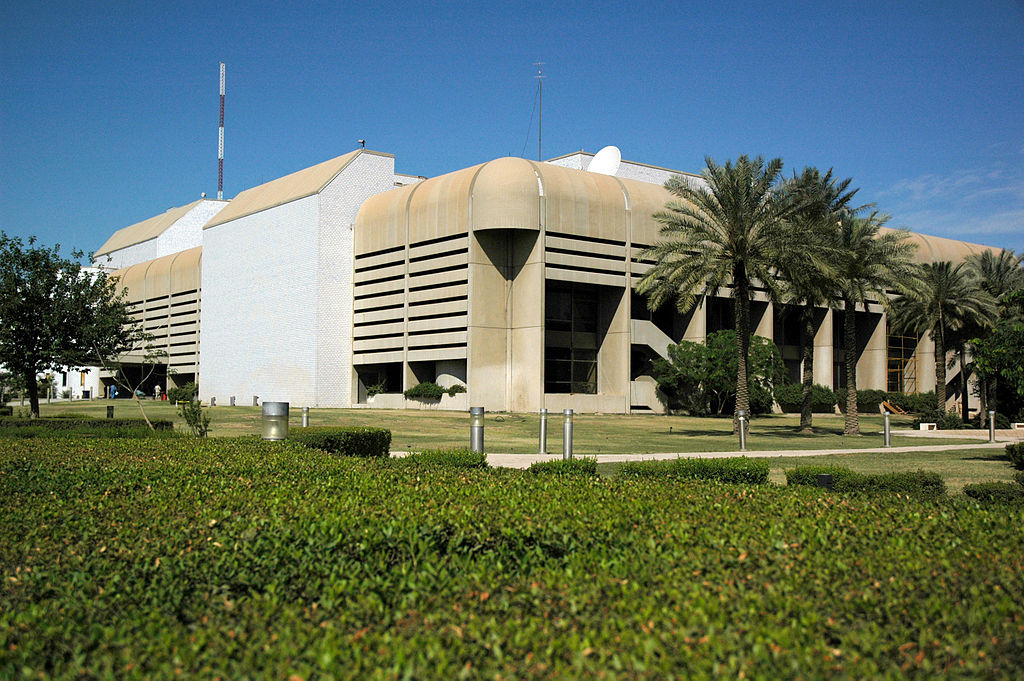Assad Regime Prepares for Idlib Offensive, U.S. Cuts Support for Palestinian Refugees, and Iraqi Factions Jockey to Form a Government
Russian Bombs Fall in Idlib Ahead of Expected Offensive

Published by The Lawfare Institute
in Cooperation With

Russian Bombs Fall in Idlib Ahead of Expected Offensive
Russian warplanes began bombing targets in Syria’s Idlib province today, a day after Iranian Foreign Minister Javad Zarif called for remaining rebel-held territory to be restored to the Assad regime and purged of militants during a trip to Damascus. The resumed air campaign is the latest indication that the Assad regime and its partners are preparing for an assault on Idlib, one of the last redoubts for the country’s rebels which, since May 2017, has been under nominal Turkish guardianship in accordance with a de-escalation agreement. Over the past year, regime forces have systematically violated the de-escalation arrangement to retake rebel-held territory zone by zone, most recently seizing Deraa and the de-escalation zone backed by Jordan in an offensive in June and July. Now it is turning its sights to the country’s northwest.
But Idlib may present greater challenges than other regime offensives. It is located along the Turkish border, which has been a conduit of support to rebel groups. As Assad’s forces have gained ground elsewhere in the country, it has often formalized its control with ceasefire deals that allowed the safe passage of some rebel fighters to Idlib. The territory has also been a refuge for Syrians fleeing violence elsewhere in the country; according to International Crisis Group, more than a third of the nearly 3 million civilians in the province are internally displaced. A new offensive would confront hardened veterans of the civil war’s deadliest battlefields, including the powerful and ideologically extremist Hayat Tahrir al-Sham and other factions which have formed “a joint operations room ... to coordinate their defence of the north west.” And it would uproot hundreds of thousands of civilians, if not more, with no place left to go other than the Turkish border.
Turkish diplomats are particularly concerned about the prospect of an Idlib offensive. Turkish troops operate at a handful of observation posts in the area. Meeting with Russian Foreign Minister Sergei Lavrov on Aug. 24, Turkish Foreign Minister Mevlut Cavusoglu warned, “A military solution here would be a disaster, not just for the Idlib region, but a disaster in terms of Syria’s future,” and pointed to the large number of displaced civilians in the area. Russia, too, has an interest in averting a catastrophe in Idlib. As International Crisis Group notes, a new offensive would undermine Russia’s new campaign to resettle returning Syrian refugees and jeopardize Turkey and Syrian rebel groups’ participation in the Astana talks. Reasserting regime control over Idlib might be a short-term victory that only further complicates a long-term settlement.
Despite these concerns, Russia has deployed a large naval presence to the eastern Mediterranean; a spokesperson for the Russian Defense Ministry claimed it is preparing for the United States to launch a false-flag chemical attack, preemptively covering for the regime’s potential use of chemical weapons in Idlib. U.S. Secretary of State Mike Pompeo has suggested that the United States would respond again to any use of chemical weapons. Zarif’s comments suggest that Tehran is actually eager for an Idlib offensive. “All of Syrian territory must be preserved and all the sects and groups should start the round of reconstruction as one collective and the displaced should return to their families,” Zarif said, according to Reuters. “And the remaining terrorists in the remaining parts of Idlib must be cleaned out and the region should be placed back under the control of the Syrian people.”
Iran will convene a meeting with Iranian President Hassan Rouhani, Russian President Vladimir Putin, and Turkish President Recep Tayyip Erdogan in Tehran on Friday, Sept. 7, to further discuss the situation in Idlib. U.S. diplomats met with Jordanian, Israeli, and Turkish officials over the weekend. On Tuesday morning, U.S. President Donald Trump tweeted, “President Bashar al-Assad of Syria must not recklessly attack Idlib Province. The Russians and Iranians would be making a grave humanitarian mistake to take part in this potential human tragedy. Hundreds of thousands of people could be killed. Don’t let that happen!” A spokesman for the Kremlin dismissed the tweet, saying, “Just to speak out with some warnings, without taking into account the very dangerous, negative potential for the whole situation in Syria, is probably not a full, comprehensive approach.”
Trump Administration Slashes Remaining Support for Palestinian Refugees
The Trump administration announced last Friday that it would be cutting off all U.S. funding to UNRWA, the U.N. agency responsible for providing support to Palestinian refugees in the West Bank, Gaza, and neighboring countries; an additional $200 million intended to support USAID projects in the West Bank, was also dropped. The move follows the administration’s decision to freeze the delivery of $100 million to UNRWA in January. Trump tweeted at the time, “we pay the Palestinians HUNDRED OF MILLIONS OF DOLLARS a year and get no appreciation or respect. They don’t even want to negotiate a long overdue… ...peace treaty with Israel. We have taken Jerusalem, the toughest part of the negotiation, off the table, but Israel, for that, would have had to pay more. But with the Palestinians no longer willing to talk peace, why should we make any of these massive future payments to them?” Before this year, the United States was funding approximately a quarter of the agency’s $1.2 billion annual budget, and the withdrawal of U.S. funding has left it with a large shortfall.
The administration’s decision is reportedly intended to push the Palestinian leadership back to negotiations, which have been stalled since the Trump administration announced its plans to unilaterally move the U.S. embassy from Tel Aviv to Jerusalem, and was reached last month at a meeting between Secretary of State Mike Pompeo and Jared Kushner. The decision also has the support of Israeli Prime Minister Benjamin Netanyahu, who told administration officials around the middle of last month that he supported a complete and immediate end to U.S. funding, according to Barak Ravid, reporting for Axios. That’s a shift from Israel’s previous position, which Ravid notes, advised “that any cut in American funding of UNRWA should be gradual and without any aid cuts to Gaza, thanks to the fear of a humanitarian collapse and an escalation on the ground.”
Netanyahu reportedly did not consult with his security cabinet before advocating that the United States should immediate halt its funding, and Israeli security officials have consistently warned that a precipitous decline in funding could lead to violence. Israeli security officials told Neri Zilber, writing for Foreign Policy, that aid to Palestinian territories had prevented another intifada. “It’s clear to me that there will be a storm and [these steps] may lead to a wave of terror,” one retired colonel told Zilber.
U.S. State Department Spokesperson Heather Nauert, announcing the administration’s decision last Friday, called the UNRWA an “irredeemably flawed operation” that supports an “endlessly and exponentially expanding community of entitled beneficiaries.” The organization operates 43 health centers, schools that educate almost 50,000 students, vocational training programs, and other services. UNRWA’s commissioner-general, Pierre Krahenbuhl, defended the agency’s operations on Monday. “No matter how often attempts are made to minimize or delegitimize the individual and collective experiences of Palestine refugees, the undeniable fact remains that they have rights under international law and represent a community of 5.4 million men, women and children who cannot simply be wished away,” he said. The United States is working with other funders, including the Gulf states, to provide interim funding to compensate for at least some of the shortfall, but U.S. officials are reportedly planning to eventually force the closure of the agency.
Two Rival Coalitions in Iraqi Parliament Vie to Form Government
It has been a long and winding road from Iraq’s elections in May to the formation of a new government; in the months since, there have been accusations of electoral fraud, arson at a ballot warehouse, an official recount, and indictments of election officials. The results were only certified three weeks ago, nearly three months after the election was held. Throughout it all, the leaders of the top-finishing blocs—insurgent cleric-turned-nationalist Muqtada al-Sadr, Shia militia leader Hadi al-Ameri, and current Prime Minister Haider al-Abadi—have been negotiating to form a governing coalition, even as the country’s politics have been roiled by protests in the oil-rich regions near Basra and escalating tensions between two key Iraqi partners, the United States and Iran.
Over the weekend, two of the blocs announced that they had come to a consensus for the formation of a government, and entered parliament on Monday with plans to formalize the arrangement. Al-Sadr and al-Abadi said Sunday that they had negotiated the support of 187 of the parliament’s 329 seats, giving them the majority necessary to form a government. But later that day, al-Ameri and Nouri al-Maliki, the ousted prime minister who remains a prominent parliamentarian, announced that, in fact, they had the largest bloc because they had poached support from some members of al-Abadi’s parliamentary list. After several official speeches in parliament on Monday, al-Ameri and al-Maliki’s supporters walked out, halting proceedings. On Tuesday, Iraqi media reported that the parliamentary session will not resume until the middle of the month.
Maliki was ousted from the office of prime minister in 2014 after stoking tensions with the country’s Sunni population, hollowing out the Iraqi military’s leadership, and failing to prevent the advance of the Islamic State. He has consistently tried to undermine his successor, the avuncular consensus candidate al-Abadi, and his alliance with al-Ameri is his latest ploy to reassert his influence. In the balance is Iraq’s relationship with two of its most powerful patrons, Iran and the United States. Al-Maliki grew apart from the United States during his tenure and Al-Ameri was Iran’s favored political figure, a leader of the Iranian-backed Shia militias that rallied to fight against the Islamic State alongside the Iraqi military. Al-Sadr is no friend of Washington (he was a prominent insurgency leader during the U.S. occupation), but his nationalist turn has also alienated Tehran, and his partner, al-Abadi, has built a reputation as a pragmatic leader who can balance the country’s delicate diplomacy.
Iraq would benefit from a steady hand in the coming months as U.S.-Iran tensions will continue to escalate after the U.S. withdrawal from the Joint Comprehensive Plan of Action. Last week, Reuters reported that Iran had transferred several short-range missiles to Shia militia groups in Iraq and is supporting domestic production of the weapons “to send a warning to the United States and Israel, especially after air raids on Iranian troops in Syria.” On Sunday, Iraqi officials dismissed the report, saying it “lack[ed] tangible evidence,” but did not deny its veracity.





